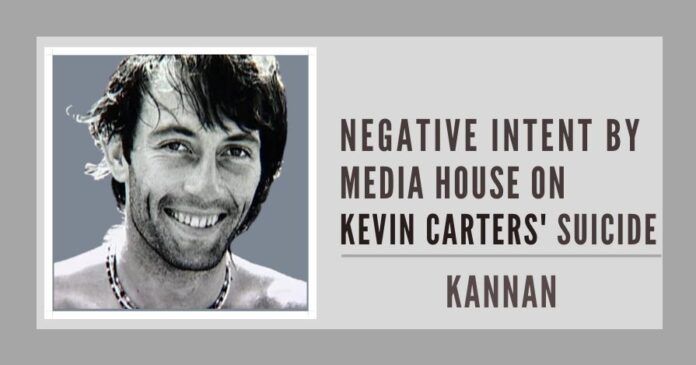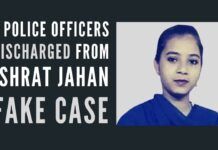
Reference to Kevin Carter in PGurus article is not based on any WhatsApp message. But certainly, Kevin Carter was mentioned.
In reference to Kevin Carter in this article published in PGurus: “This is time to remember Kevin Carter, a photographer who won the Pulitzer Prize for covering the famine in Sudan. He committed suicide at the age of 33 after witnessing the horrors because he felt he was taking photos instead of helping the girl who was crawling to a food distribution shelter[1].”
And yes, Kevin shooed the vulture away after taking the photograph. Reference to Kevin in PGurus article was only a passing reference, unlike the Radio Free[2] article. The prime purpose of the PGurus article was on how to tackle the COVID situation[1].
Kevin was supposed to be unattached as a media person doing his duty – much like a doctor or police. He did it. He got an award. He got criticized. He committed suicide – at the age of 33[3]. The author believes Kevin’s suicide was the result of the depression he endured because of work-related stress. As an individual, he has the right to believe so.
Radio Free passed a judgement of their own, based on what they believed. No problem with that. However, they went on to quote the article of TIME that contradicted their judgment.
Now, if someone wanted to delink Kevin’s suicide from his work, they can. But, they only ignoring the entire subject of “Depression due to work-related stress.” It was unfortunate Kevin could not withstand the stress and committed suicide.
Here is a verbatim reprint from the Radio Free article: “Carter had bounced from romance to romance, fathering a daughter out of wedlock,” reads the TIME piece hinting at an unstable personal life. Carter’s suicide note mentioned in TIME talked of financial troubles. He wrote: “depressed… without phone… money for rent… money for child support… money for debts… money!!!… I am haunted by the vivid memories of killings & corpses & anger & pain… of starving or wounded children, of trigger-happy madmen, often police, of killer executioners … I have gone to join Ken if I am that lucky[4].”
So, it is clear that many people believe that Kevin’s suicide and his works are connected. The prize-winning photograph is just the tipping point. At the starting of this paragraph, Radio Free wrote “There is no literature claiming that the vulture and the child photograph was the reason for his death.” Here, Radio Free passed a judgement of their own, based on what they believed. No problem with that. However, they went on to quote the article of TIME that contradicted their judgement[4].
So, Radio Free saying “PGurus promoted the misinformation that Kevin Carter committed suicide due to the horrors of the Sudanese famine” is absolutely ridiculous as even their own article quoted TIME saying the same thing.
If Kevin’s suicide is not related to his work, stop relating suicides of every professional to their line of work and the stress they endured.
As Radio Free claimed this as a ‘fact check’, it is the responsibility of Radio Free to prove that there is no link between Kevin’s suicide and the horrors he witnessed while he was doing his job[5]. Instead, they choose just to ridicule the concept of “depression due to work-related stress.” In fact, this is one reason why media is losing its significance and relevance. The same media who delinks Kevin’s work from his suicide would churn out articles on how actors, doctors, soldiers, and other professionals committed suicide due to work-related stress. Either you believe in one concept or not. But, you can’t believe two contradicting theories. If Kevin’s suicide is not related to his work, stop relating suicides of every professional to their line of work and the stress they endured.
Finally, here is what National Public Radio, another independent, non-profit media organization said on this topic: “Haunted by the horrific images from Sudan, Carter committed suicide in 1994 soon after receiving the award.” This story was published on March 02, 2006, – long before PGurus published a similar opinion[6].
The point here is, the readers shall look for the possible motives of any article – published in either PGurus or Radio Free or any other website. While the article in PGurus was only about the indifference of media in solving the problems of migrants and how to tackle the COVID problem, the article in Radio Free was primarily motivated by the intent of proving someone else as wrong – be either the solicitor general or PGurus article. And, that is a negative intent for a media house. But, that was what we were discussing. Yes?
Note:
1. The views expressed here are those of the author and do not necessarily represent or reflect the views of PGurus.
References:
[1] Micro-management of COVID-19 and reopening of economy – May 17, 2020, PGurus.com
[2] SOLICITOR GENERAL TUSHAR MEHTA QUOTES FALSE WHATSAPP FORWARD IN SUPREME COURT – May 30, 2020, Radiofree.org
[3] Kevin Carter, a Pulitzer Winner For Sudan Photo, Is Dead at 33 – Jul 29, 1994, NY Times
[4] The Life and Death of Kevin Carter – Jun 24, 2001, TIME
[5] From the archive, 30 July 1994: Photojournalist Kevin Carter dies – Jul 30, 2014, The Guardian
[6] A Pulitzer-Winning Photographer’s Suicide – Mar 2, 2006, NPR
- Prashant Kishor & the quest for opposition - February 2, 2022
- Return of Taliban and the future of the world - August 18, 2021
- Time for BJP to stop quoting Indian History and learn something from it. - May 3, 2021










